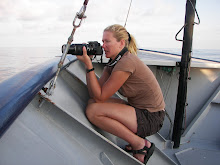 Yesterday we broke down our sixth and final experiment! We have several more days to go before arriving (and departing from) McMurdo Station, so we are using this time to examine slides, analyze some of our results, and to begin the task of packing up our scientific gear for its return trip home.
Yesterday we broke down our sixth and final experiment! We have several more days to go before arriving (and departing from) McMurdo Station, so we are using this time to examine slides, analyze some of our results, and to begin the task of packing up our scientific gear for its return trip home.Our ship has been remaining within the south-central polynya so that the geologists can use multibeam technology in the relatively ice-free waters here to map out the ocean floor. Here the seas are a bit rougher and despite having been at sea for more than 4 weeks now, many of us have been struggling again to get our sea legs. It can be a very different experience when the ship is in open water, not only for its rougher disposition, but for the reduced amount of scenery. While we are in the pack ice, there are frequent opportunities to spot seals and penguins. Here, however, we are onlyoccasionally treated to a passing ice floe, or a far-off iceberg on the horizon. It reminds us how unique this environment is and how fortunate we are to have the pack ice and ice floes to break up the monotony of open water travel.
 Many research cruises spend weeks at sea in the open water without land or substrate of any kind, asituation similar to our experience here in the polynya. It is continuing to get darker each night and the temperatures have dropped slightly. In many areas, we have also seen pancake ice, which are small, pancake-shaped pieces of ice and are the first stages of sea ice formation; all of these indicators of an ending summer in Antarctica, and an end to our time in this beautiful, far-off place.
Many research cruises spend weeks at sea in the open water without land or substrate of any kind, asituation similar to our experience here in the polynya. It is continuing to get darker each night and the temperatures have dropped slightly. In many areas, we have also seen pancake ice, which are small, pancake-shaped pieces of ice and are the first stages of sea ice formation; all of these indicators of an ending summer in Antarctica, and an end to our time in this beautiful, far-off place..jpg)





No comments:
Post a Comment